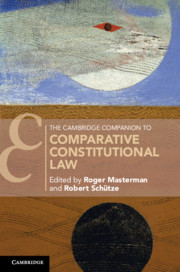Book contents
- Reviews
- The Cambridge Companion to Comparative Constitutional Law
- Cambridge Companions to Law
- The Cambridge Companion toComparative Constitutional Law
- Copyright page
- Contents
- Notes on Contributors
- Acknowledgements
- Table of Cases (Selection)
- Abbreviations
- Introduction
- Part I Theoretical Foundations
- Part II Historical Experiences
- Part III Constitutional Principles
- Part IV State Institutions
- Part V Transnational Constitutionalism
- 18 Multi-Layered Constitutions
- 19 International Constitutionalism
- 20 European Constitutionalism
- 21 A New Commonwealth Constitutionalism?
- 22 Constitutional Transplants
- Index
- References
19 - International Constitutionalism
from Part V - Transnational Constitutionalism
Published online by Cambridge University Press: 30 September 2019
- Reviews
- The Cambridge Companion to Comparative Constitutional Law
- Cambridge Companions to Law
- The Cambridge Companion toComparative Constitutional Law
- Copyright page
- Contents
- Notes on Contributors
- Acknowledgements
- Table of Cases (Selection)
- Abbreviations
- Introduction
- Part I Theoretical Foundations
- Part II Historical Experiences
- Part III Constitutional Principles
- Part IV State Institutions
- Part V Transnational Constitutionalism
- 18 Multi-Layered Constitutions
- 19 International Constitutionalism
- 20 European Constitutionalism
- 21 A New Commonwealth Constitutionalism?
- 22 Constitutional Transplants
- Index
- References
Summary
International law has always been conceived as a project involving sovereign and equal states, who would be forever locked in battle with each other – if not literally, then at least metaphorically. The international legal order, such as it is, was always conceptualized as a horizontal order, mostly geared towards facilitating the co-existence of states, and with scant attention for planetary unity, or even for the interests of individual human beings. International law was made by states, to regulate relations between states, and for the benefit of states. What happened within those states was long considered anathema, and nothing was supposed to exist above those states.
- Type
- Chapter
- Information
- The Cambridge Companion to Comparative Constitutional Law , pp. 498 - 520Publisher: Cambridge University PressPrint publication year: 2019

